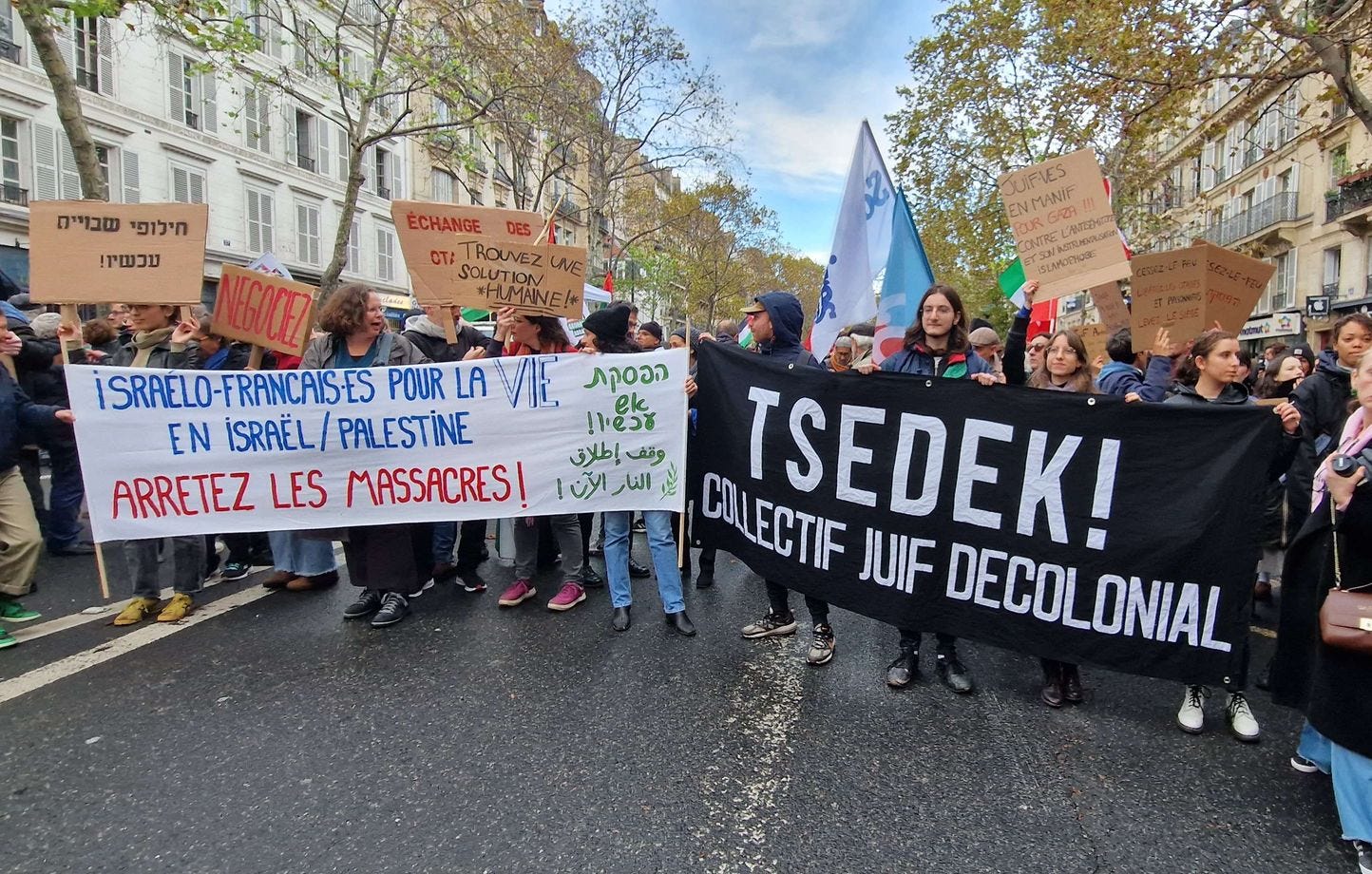A Minority Within a Minority: The Jewish Antizionists of France
A small group of Jewish activists in France are challenging the common association between Jewish identity and support for Israel.

On a wet afternoon in Paris, the rain lifted just as the march began. Palestinian flags filled the avenue; chants rolled ahead like a tide. Near the edge of the crowd, another banner — Hebrew words, held high by a handful of Jewish protesters. Not in opposition to the march, but moving with it.
The people carrying that banner are members of Tsedek!, a Jewish antizionist collective launched in Paris in 2023. In less than two years, they have become a recurring sight at pro-Palestinian demonstrations — and a recurring subject in a French media landscape that can't quite decide what to do with them.
Pretty much every debate on French TV now follows the same script: any mention of antisemitism immediately triggers warnings about radical Islam, any discussion of Islamophobia pivots to fears about antisemitism. The two can't exist in conversation without each other, as though the media's compass has no other coordinates.
The actual Jews and Muslims watching this choreographed performance know they're not being protected. They're being weaponized. Each community becomes a cudgel to beat the other with, their safety invoked only when it serves someone else's argument.
Tsedek! refuses to play their assigned part.
French Jews have lived through antisemitism for decades, and over time have developed a set of inherited defenses, most outside of their own control: religious networks, the symbolic and political bond with Israel, and increasingly a media ecosystem that positions them in permanent opposition to Muslims — who are now cast as their main oppressors. For many, these aren't just political positions; they are the architecture of survival. When your grandmother hid in a cellar in 1942, when your parents arrived from Algeria with nothing in 1962, the idea of voluntary exposure feels like madness.
Standing in that march, flanked by keffiyehs and Palestinian flags, Tsedek!'s members know what image they create. They know how it will be used — by the left as proof that solidarity transcends identity, by the right as evidence of Jewish self-hatred. By everyone, it will be used as ammunition.
French media outlet Franc-Tireur recently called them "useful idiots." The phrase stings. It reveals the inescapable nature of political commentary. You're an object of attention, a little clown in a box. And when you escape the box, that's when you find out that box was already inside another, bigger box.
The clash runs deeper than current politics. Since emerging in the late 19th century, Zionism has been both political project and, after 1948, practical refuge — the Holocaust transformed it from option to necessity in many minds. There were always Jewish critics: ultra-Orthodox leaders who rejected its secular foundations, leftists who feared that building an ethnostate would ironically reproduce the exclusions Jews had endured for centuries. In postwar France, those voices dwindled. Zionism became not just consensus but to many synonym for the existence of Judaism.
This is why public antizionism from within the Jewish community reads less as policy disagreement than as familial betrayal. You're not just wrong; you're abandoning the mechanism that kept your people alive.
So, should these people stay in their lane? No one could blame them if they did. Jews have been persecuted for centuries. But can they stay silent about a state's actions in exchange for that sense of community? Can you bear watching Palestinian children die on you phone while your community's official voices insist this is necessary for your safety (or outright deem it fake news).
Meanwhile, French politicians keep perfecting their routine. Marine Le Pen discovers her love for Jews when it lets her attack Muslims. Mélenchon loves Palestinians, especially when it lets him sidestep questions about antisemitism in his own ranks. The mainstream center deploys both communities like chess pieces, forever concerned about Republican values, forever doing nothing about the colossal social divisions they helped perpetuate. And when the traces on the ground get a little too bloody, let us recognize Palestine and be on the right side of History, because the cameras are watching and we want to put on a good face.
Into this cynical theater walks Tsedek!, carrying a banner that scrambles the whole production. They can't be dismissed as self-hating because they're openly, proudly Jewish. They can't be claimed as tokens because they keep criticizing the antisemitism they encounter in leftist spaces. They exist in the gap between the stories France tells itself.
Their gamble is that repetition — showing up again and again where they're "not supposed" to be — will eventually exhaust the old narratives, the very same narratives that are costing hundreds of lives in Gaza as these words are written. That their presence will make the binary impossible to maintain.
The march moves on. The banner moves with it. Tomorrow, a photographer will run the shot: proof, depending on the caption, of either Jewish self-hatred or the Republic's beautiful plurality. Neither story is true. But the third story — the one about people who refuse their assigned roles in a national and international information bubble — doesn't fit in anyone's frame. Yet.


